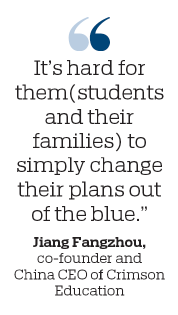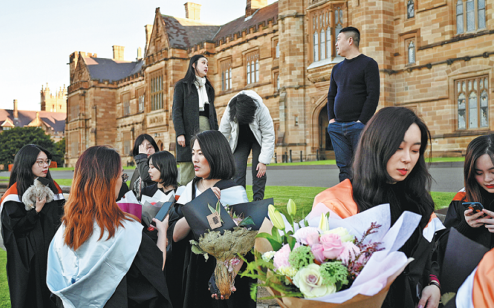STUDENTS WIDEN HORIZONS FOR OVERSEAS STUDIES

Families look beyond US due to pandemic, other factors
Jin Zihao, an 18-year-old graduate from an elite private senior high school in Shanghai, should have begun his studies as a freshman at a university in the United States at the start of the fall semester.
However, the pandemic and other factors have meant that Jin is reassessing his plans to register with Emory University in Atlanta, Georgia.
The teenager, who has long wanted to study in the US, is taking a gap year and is also considering an offer from the London School of Economics and Political Science in the United Kingdom.
He said that if there was social unrest between rival supporters of the two main political parties in the US in the runup to next month's crucial runoff elections in Georgia for the Senate, he would choose to study in the UK.
He added that he would also make such a decision for his safety if there was any discrimination against Asians in the US, or if there were significant changes in the country's policy toward international students that would affect his academic and career development.
Jin said the UK's attraction for him is increasing following the introduction of a visa policy late last year that allows international students to work in the country for two years after graduation. There have also been fewer reports of discrimination or violence against Asians and other groups in the UK than in the US, he said.
Despite the pandemic, several organizations helping Chinese students seek opportunities to study abroad have said the number of new applications received by higher education institutions in the US and UK has not fallen compared with last year.
Jiang Fangzhou, co-founder and China CEO of Crimson Education, a consultancy based in New Zealand that assists students seeking opportunities to study at top universities worldwide, said it takes the students and their families at least three years to prepare for studies overseas.
"It's hard for them to simply change their plans out of the blue," he added.
With vaccines being developed, Chinese students and their parents have generally adopted an optimistic attitude toward the pandemic and also to international relations, he added.
However, Jiang said that in view of uncertainties regarding the pandemic, the international political situation, visas and travel, some students are looking at more countries as overseas study destinations.
Jin said that for years, the US has remained his sole option due to a variety of reasons. He cited the fact that students in the US have a further year of undergraduate study than in the UK. There is also a "broader vision" in the US for students to learn and explore diverse fields during undergraduate studies, more options for master's and doctoral programs, and more internship and employment opportunities, he added.
"Various social and educational factors may be influencing my choice, but if the Ivy League schools change their policies for international students doing master's programs, this will be a minus for the US," Jin said.
His father, Jin Guoxiang, said he fully supports the decision to take a gap year, which his son is spending by taking open classes organized by the Massachusetts Institute of Technology in the US and traveling to at least 10 cities in China.
"No matter which country he chooses, I feel that with the mass availability of vaccines, the pandemic could be over by next summer," said Jin Guoxiang, 47, who works for a German architectural technology company.
Canada considered
Meanwhile, Fang Zhuoxin, an 11th grade student in Shanghai, said all students at her international school traditionally go to its Boston campus in the US for the 12th grade. However, due to the pandemic, she and her classmates are applying to schools elsewhere.
"I'm looking for possibilities at high schools in Canada. This may make it easier for me to get a student visa in the first half of next year to guarantee my travel in summer," said Fang, 16, who studied at a leading junior middle school in Hangzhou, capital of Zhejiang province.
Having traveled to the US numerous times, she said she enjoys the academic atmosphere in Boston, but realizes she may not be able to go to the country due to the pandemic affecting visas and flights.
"Regardless of whether I finally go to the US or Canada, I look forward very much to years of studying abroad, where students can fully participate in class discussions and there are plenty of course alternatives," Fang said.
Her mother said that despite concerns about the pandemic, including reports of anti-vaccination demonstrations taking place in Vancouver, Canada, she will encourage her daughter to go abroad as planned.
"Studying abroad is a process that accelerates and broadens the experience of reaching adulthood. When she needs to cope with problems on her own, she will become more cool-headed, confident and will broaden her personality," said the mother, who requested anonymity.
Jiang, from Crimson Education, said there has not been a slump in the overseas education market, as many people have imagined.
"Schools such as Cornell University and Duke University have reported year-on-year rises of 36 percent and 20 percent respectively in the number of early applicants. This may be partly attributable to test-optional policies," he said.
Test-optional policies give college applicants the choice of whether or not to submit their standardized test scores with their admission applications.
In September, a report published by higher education analysts QS Quacquarelli Symonds in London showed that 4 percent of Chinese students interested in studying abroad will abandon the idea.
"The rate was lower than in India, Europe and North America," Jiang said.
Gregory D. Hess, president and CEO of the Institute for the International Education of Students Abroad, and the Study Abroad Foundation, said that surveys and consultations showed that Chinese students and their families see the long-term benefits and value of studying overseas. However, there has been a fall in the number of international students due to travel restrictions and other factors.
With the world trying to end the pandemic through one means or another, there is going to be a "pretty sharp" rebound in opportunities to study abroad, he said, adding,"Universities in the West will be keen to have Chinese students back."
Amber Mercier, vice-president for strategy, new business initiatives and analytics for IES Abroad and SAF, said major global incidents such as the 9/11 attacks in the US and the SARS outbreak in China in 2003 had a short-term impact on overseas studies, but there was often a significant rebound afterward.
"We've seen how such situations have played out many times in the past," she said.
Degree programs
During a year of uncertainty, more Chinese families are looking to non-English-speaking European countries for their children's overseas studies, according to industry insiders.
Jiang said more such nations, including the Netherlands, Italy and Spain, have introduced college degree programs in English so that students and parents do not need to worry about language barriers.
"An advantage of these countries is that tuition is usually half the cost of that in the UK or less. It's clear that these countries have become increasingly popular this year because of the pandemic," he said.
Jiang added that some students prioritize the US because of its strength in some fields, including science and engineering, computer science, and finance, but majors such as international trade and culture at a university in an influential European country can bring more opportunities.
Hess said nearly half the world's leading higher education institutions are in Europe, and many young people preparing to go to a non-English-speaking country have already basically mastered the local language, which offers them new opportunities.
Chen Yinan, a final-year undergraduate majoring in clothing design at Shanghai University of Engineering Science, originally planned to go to the UK to study for a master's, but is now also considering France.
"I believe that for this profession, learning experience and exposure in Europe, no matter whether it is in the UK or France, will be a major plus in competition for jobs in the future," said Chen, 22, who has been learning French for the past six months.
"I've traveled to France and really enjoyed the atmosphere, freedom and their design styles."
zhouwenting@chinadaily.com.cn

























